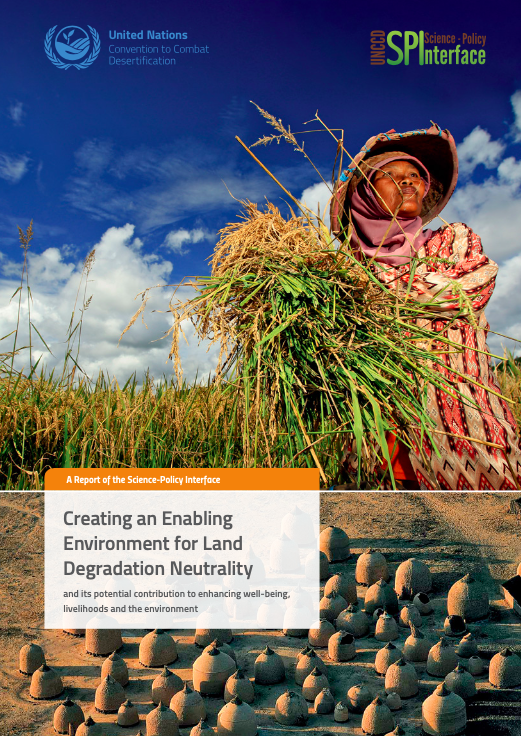Location
The United Nations Convention to Combat Desertification in Those Countries Experiencing Serious Drought and/or Desertification, Particularly in Africa (UNCCD) is a Convention to combat desertification and mitigate the effects of drought through national action programs that incorporate long-term strategies supported by international cooperation and partnership arrangements.
Members:
Resources
Displaying 146 - 150 of 585Creating an Enabling Environment for Land Degradation Neutrality and its potential contribution to enhancing well-being, livelihoods and the environment
The Sustainable Development Goals (SDGs) adopted by the United Nations General Assembly in September 2015 include a target on land degradation neutrality (LDN) (SDG 15.3). Attaining and maintaining LDN requires addressing a land governance challenge to steer land management towards avoiding, reducing and reversing land degradation.
Land Degradation Neutrality (LDN) Fund. An innovative impact investment fund for sustainable land use, with a linked TA Facility
The challenge of land degradation Sustainable land use is closely connected with many sustainable development objectives Land Degradation Neutrality (LDN). It is estimated that two billion hectares of land is degraded worldwide, and we continue to degrade another 12 million hectares of productive land every year. According to the 2018 World Atlas of Desertification produced by the European Commission’s Joint Research Centre, 75% of the Earth’s land area is already degraded, and over 90% could become degraded by 2050.
Combining Earth Observations, Cloud Computing, and Expert Knowledge to Inform National Level Degradation Assessments in Support of the 2030 Development Agenda
Monitoring progress towards the 2030 Development Agenda requires the combination of traditional and new data sources in innovative workflows to maximize the generation of relevant information. We present the results of a participatory and data-driven land degradation assessment process at a national scale, which includes use of earth observation (EO) data, cloud computing, and expert knowledge for Argentina.
Land in numbers 2019. Risks and opportunities.
Numbers can tell a compelling story. In this brochure, the numbers highlight how much we rely on productive land. Amongst other valuable services, land feeds our families, provides fresh water and powers our future ambitions. Much of the data collected here, however, demonstrate how close we are to pushing our relationship with the land to breaking point. The magnitude of the challenges and potential consequences of failing to implement bold action on land and soil, in terms of future social stability and economic development, should not be underestimated.
Global Land Outlook: West Africa Thematic Report: Land Degradation Neutrality: Benefits for Human Security
Located in the arid and semi-arid areas of West Africa, the Sahel has undergone profound changes over the past 50 years. Known for the prevalence of land degradation processes, the Sahel is suffering from the combined negative effects of population growth, human activities and climate variability, resulting in recurrent droughts and the continued decline of natural resources and land productivity.



